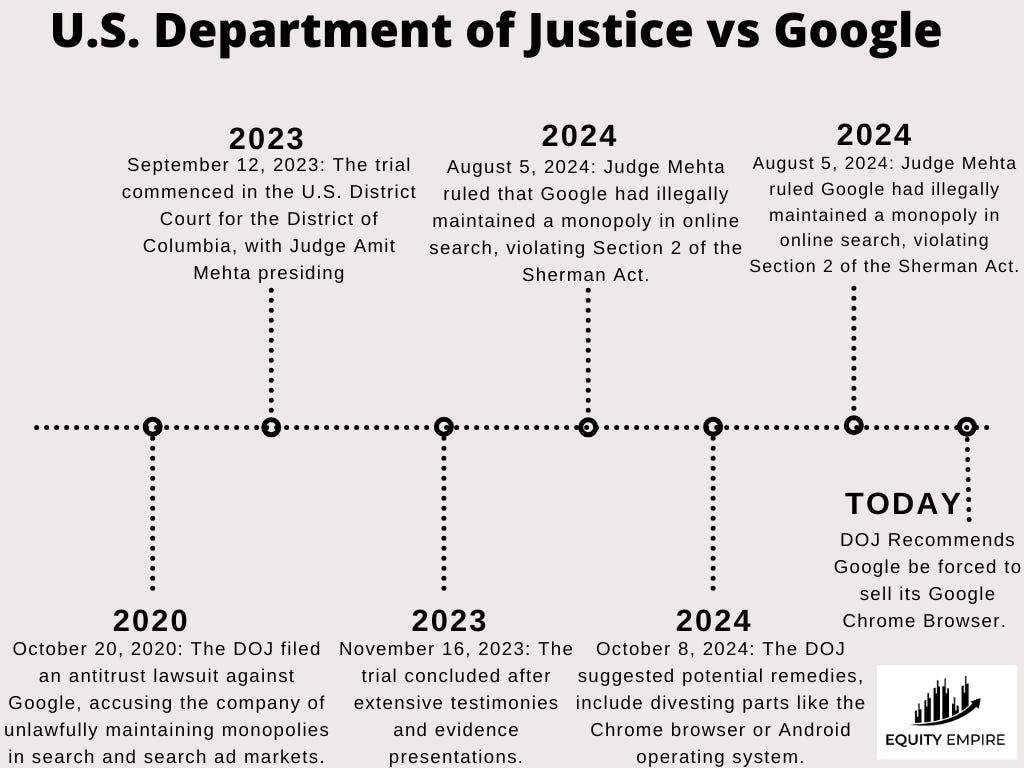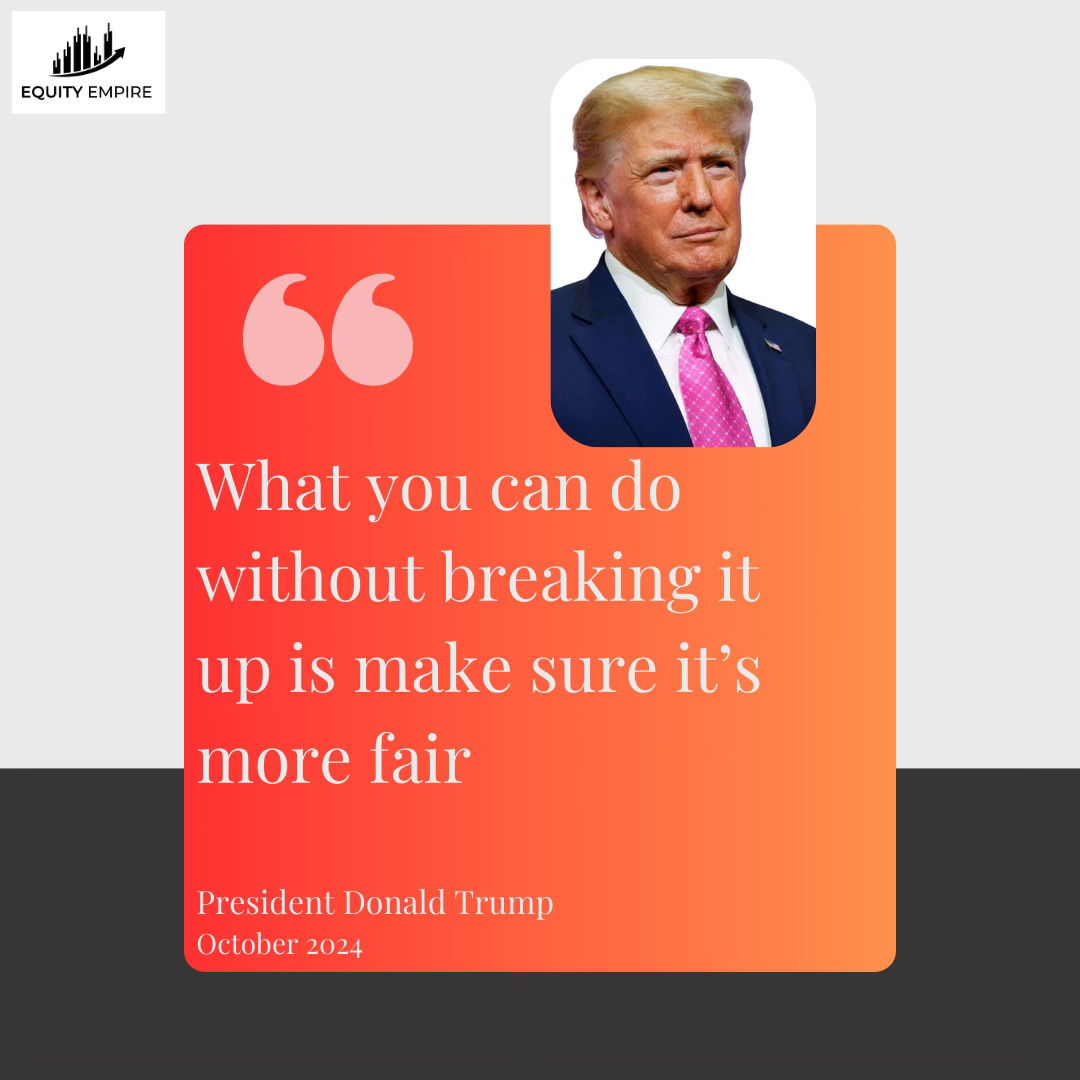Google Under Fire: DOJ Pushes for Chrome’s Forced Sale
Today we’ll go over the purposed actions Google may have to take if this verdict is deemed final. The potential impact it has on Google’s financials and investors. And how an incoming Trump era.
In what will likely be viewed as a landmark case against Google, a U.S. District Court has found the tech giant liable for maintaining monopolies in the general search and search advertising markets.
And today the department of justice provided a detailed proposal outlining specific measures to address Google's monopolistic practices.
The biggest being the DOJ is suggesting that Google sell its popular Chrome browser and stop paying to be the default search engine on Apple devices among others.
The implications of this ruling could reshape the digital landscape, and more importantly Google as an investment.
Today we’ll go over the purposed actions Google may have to take if this verdict is deemed final. The potential impact it has on Google’s financials and investors. And how an incoming Trump administration might change the outcome.
Google’s dominance in search services and search advertising has shaped the online experience for more than a decade. According to the court, Google’s monopolistic practices have stifled innovation, blocked rivals, and harmed consumers. The government argues it’s time to dismantle the structures that have allowed Google to monopolize the industry and restore competitive balance.
This week the DOJ has asked a federal judge to order Google to:
Sell its Chrome browser, a move aimed at breaking up its control over online search, where it handles about 90% of all searches.
The agency also wants Google to stop paying companies like Apple to make its search engine the default on devices.
Google must allow websites to “opt out” of its data/information from being shown in AI snippets at the top of search results.
And Google must divest its Android phone business or have the court supervise the division to prevent anti-competitive practices.
The DOJ argues that Google's dominance stems from illegal tactics, creating an unfair playing field that stifles competition and consolidates its power in search and advertising markets.
Google's highly profitable ad business relies heavily on data collected from Chrome and search, which the DOJ says must be separated to promote competition.
Google has pushed back in a blog post, calling the DOJ's proposals "staggering" and claiming they would harm security, innovation, and economic leadership. Google will continue to fight the case on appeal.
Keep in mind a final judgement (pending appeals) is not expected until August of 2025, and the DOJ’s recommendations could be adopted in full, or just in part by the judge.
Google itself will unveil its own set of remedies to the court in December and the judge will take both the DOJ’s recommendations and Google’s into account.
Let’s take a moment and actually unpack how this ruling would actually work in reality.
The DOJ is suggesting Google sell its Chrome browser … which is estimated to be worth $20 Billion or more.
Beyond the current tech giants, there’s hardly anyone with the financial capacity to invest the multi-billion dollars (or more) required to acquire Chrome. If the government were to intervene and nationalize it as a public utility, it could push us closer to a model resembling China's approach to regulating technology companies in that country.
Let’s assume a new buyer is found for the Google Chrome browser, that set of investors would (naturally) be looking for a return on the multi-billion dollar investment. With Governments (particularly in Europe) cracking down on data sharing, it’s unclear how a new buyer would monetize the asset in a different way than Google has.
Keep in mind the main competitors to Google Chrome (Firefox, Safari) collect money from Google to be the default search engine. It could be argued that Firefox might not exist if it wasn’t for Google!
Of course it’s worth discussing that a final ruling in the case won’t occur under the President Joe Biden administration. Instead, pending appeals, President-Elect Donald Trump’s DOJ will have the final say.
It’s still unclear who will head the Department of Justice under the Trump administration, but that hasn’t stopped the former, and soon-to-be current president from weighing in on the case.
President-elect Donald Trump's position on the potential breakup of Google has evolved over time. Initially, he expressed strong criticism of the company, suggesting that it "has to be careful" or it might be "close to shut down."
Some of the former President’s comments might be related to actions the platform has taken against him in the past including banning his YouTube account.
However, in more recent statements, Trump has shown reluctance to endorse a breakup. In October 2024, he questioned the benefits of such an action, asking, "If you do that, are you going to destroy the company?"
President Trump suggested that ensuring fairness could be achieved without dismantling the company. This shift indicates a more cautious approach, balancing concerns over Google's market power with the potential consequences of a breakup.
Much remains unclear at the moment. But a few things are certain.
Once the judge finalizes the ruling next year, Google can appeal. That process would likely take years and span the entire President Trump term and overlap into a new administration.
Years for Google under the status quo is hundreds of billions in revenue/profits. It also gives time for the technology landscape to shift away from traditional search/browsers to something else like AI/chat.
Assuming the worst for Google, divesting from a multi billion dollar asset would return some capital to shareholders.
Additionally the company could be in a position to reshape how payments are distributed.
Currently Google pays other companies for access to your data. Conceivably Google could flip the script and pay users (instead of Apple) for you to use their search engine.
How likely would you stick with Google if you were being paid to use the site?
Google’s competition would wither on a vine if that was the case.
Google stock is a buy as it moves back in the $150’s.





